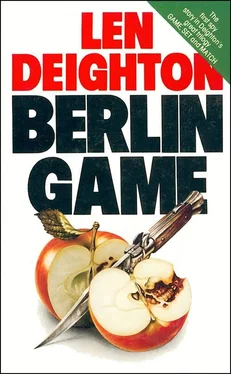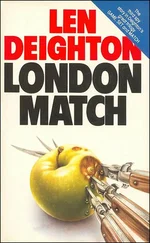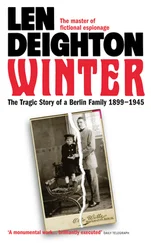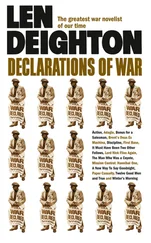Len Deighton - Berlin Game
Здесь есть возможность читать онлайн «Len Deighton - Berlin Game» — ознакомительный отрывок электронной книги совершенно бесплатно, а после прочтения отрывка купить полную версию. В некоторых случаях можно слушать аудио, скачать через торрент в формате fb2 и присутствует краткое содержание. Жанр: Триллер, на английском языке. Описание произведения, (предисловие) а так же отзывы посетителей доступны на портале библиотеки ЛибКат.
- Название:Berlin Game
- Автор:
- Жанр:
- Год:неизвестен
- ISBN:нет данных
- Рейтинг книги:4 / 5. Голосов: 1
-
Избранное:Добавить в избранное
- Отзывы:
-
Ваша оценка:
- 80
- 1
- 2
- 3
- 4
- 5
Berlin Game: краткое содержание, описание и аннотация
Предлагаем к чтению аннотацию, описание, краткое содержание или предисловие (зависит от того, что написал сам автор книги «Berlin Game»). Если вы не нашли необходимую информацию о книге — напишите в комментариях, мы постараемся отыскать её.
Berlin Game — читать онлайн ознакомительный отрывок
Ниже представлен текст книги, разбитый по страницам. Система сохранения места последней прочитанной страницы, позволяет с удобством читать онлайн бесплатно книгу «Berlin Game», без необходимости каждый раз заново искать на чём Вы остановились. Поставьте закладку, и сможете в любой момент перейти на страницу, на которой закончили чтение.
Интервал:
Закладка:
Giles Trent came in early. I studied him with new interest. He was younger-looking than I remembered him. He took off his brown narrow-brimmed felt hat in a quick and nervous gesture, like a schoolboy entering the headmaster's study. His grey wavy hair was long enough to hide the tops of his ears. He was so tall that the club's low ceiling caused him to lower his head as he passed under the pink tasselled lampshades. He put his riding mac on the bentwood hanger and ran his fingers through his hair as if it might have become disarranged. He was wearing a Glen Urquhart check suit of the sort favoured by wealthy bookmakers. It came complete with matching waistcoat and gold watchchain.
'Hello, Kar,' Trent said to the old man seated near the radiator, nursing his usual whisky and water. Most of the members called him Kar. Only some of the older Poles who'd served with him in Italy knew that Kar was his family name.
Trent stayed at the counter where young Arkady dispensed cold snacks, the inimitable rum punch that his father was said to have invented under battle conditions in Italy, good coffee, warm beer, iced vodka, poor advice about chess and unpalatable tea. Trent took rum punch.
'Mr Chlestakov hasn't been in tonight,' the youth told Trent.
Trent grunted and turned to look round the room. I stared down at my chess problem. By resting my chin in my hand, I was able to conceal my face from him.
Trent 's Russian arrived about ten minutes later. He was wearing an expensive camel-hair coat and handmade shoes. He only came up to Trent 's shoulder, a potbellied man with big peasant hands and a jolly face. When he took his hat off, he revealed dark hair brilliantined and carefully parted high on the crown of his head. He smiled when he saw Trent and slapped him on the shoulder, asked him how he was, and called him 'tovarisch'.
I recognized the type; he was the sort of Soviet official who liked to show the happy friendly side of life in the USSR. The kind of man who never arrived at a party without a couple of bottles of vodka, and winked to let you know he was an incorrigible rogue who'd break any rule for the sake of friendship.
Trent must have asked him what he wanted to drink. I heard the Russian say loudly, 'Vodka. I only come here to drink my Polish friend's fine buffalo-grass vodka.' He spoke the smooth English that is the legacy of the teaching machine but lacked the rhythms that can only come from hearing it spoken.
They sat down at the table Trent had selected. The Russian drank several vodkas, laughed a lot at whatever Trent was telling him, and ate pickled herring with black bread.
There was a chessboard and a box of well-worn chess pieces on every table. Trent opened the board and set up the chess pieces. He did it in the measured, preoccupied way that people do things when they are worrying about something else.
The Russian gave no sign of being worried. He bit into his fish hungrily and chewed the bread with obvious delight. And every now and again he would call across the room to ask old Jan Kar what the weather forecast was, the rate of exchange for the dollar, or the result of some sporting fixture.
Old Jan had been in a Russian prison camp from 1939 until he was released to go into the General Ander's Polish Corps. He did not like Russians, and the answers he gave were polite but minimal. Trent 's Russian companion gave no sign of recognizing this latent hostility. He smiled broadly at each answer and nodded sympathetically to acknowledge old Jan's flat-toned negative answers.
I got up from my seat and went over to the counter to get another drink – coffee, this time – and from there, keeping my back towards them, I was able to hear what Trent was saying.
'Everything is slow,' said Trent. 'Everything takes time.'
'This is just a crazy idea that comes now into my head,' said the Russian. Take everything you have down to the photocopying shop in Baker Street, the same place you got the previous lot done.'
The Russian had spoken quite loudly and, although I didn't look round, I had the feeling that Trent had touched his sleeve in an effort to quieten him. Trent 's voice was softer. 'Leave it with me,' he said. 'Leave it with me.' The words came in the anxious tones of someone who wants to change the subject.
'Giles, my friend,' said the Russian, his voice slurred as if by the effects of the vodka. 'Of course I leave it with you.'
I took the coffee that Jan's son poured and went back to my table. This time I sat on another chair to keep my back turned to Trent and the Russian, but I could see them reflected faintly in a fly-specked portrait of General Pilsudski.
I continued to work my way through one of the Capablanca's games against Alekhine in the 1927 championships, although I did not understand the half of it. But by the time Capablanca won, Trent and the Russian had disappeared up the stairs and out into the street.
'Can I join you, Bernard?' said old Jan Kar as I tipped my chess pieces into their box and folded my board. 'I haven't seen you for years.'
'I'm married now, Jan,' I said. 'And I never was much of a chess player.'
'I heard about your dad. I'm sorry. He was a fine man.'
'It's a long time ago now,' I said.
He nodded. He offered me a drink, but I told him I would have to leave very soon. He looked round the room. It was empty. Everyone was in the room next door watching a game that had developed into a duel. 'Working, are you? It was that Russian, wasn't it?'
'What Russian?' I said.
'Insolent bastard,' said Jan Kar. 'You'd think they wouldn't go where they're not welcome.'
That would seriously limit their movements.'
'I'll keep it to myself, of course. And so will my son.'
'I wish you would, Jan,' I said. 'It's very delicate, very delicate.'
'I hate Russians,' said old Jan.
Giles Trent's house was one of a terrace of narrow-fronted Georgian-style dwellings erected by speculative builders when the Great Exhibition of 1851 made Chelsea a respectable address for senior clerks and shopkeepers. Near the front door – panelled and black, with a brass lion's-head knocker – stood Julian MacKenzie, a flippant youth who'd been with the Department no more than six months. I'd chosen him to keep an eye on Trent because I knew he wouldn't dare ask me too many questions about it or expect any paperwork.
'He arrived home in a cab about half an hour ago,' MacKenzie told me. 'There's no one inside with him.'
'Lights?'
'Just on the ground floor – and I think I saw some lights come on at the back. He probably went into the kitchen to make himself a cup of cocoa.'
'You can go off duty now,' I told MacKenzie.
'You wouldn't like me to come in with you?'
'Who said I'm going in?'
MacKenzie grinned. 'Well, good luck, Bernie,' he said cheerfully, and gave a mock salute.
'When you've been with the Department for nearly twenty years and the probationers are calling you Bernie,' I said, 'you start thinking that maybe you're not going to end up as Director-General.'
'Sorry, sir,' said MacKenzie. 'No offence intended.'
'Buzz off,' I said.
I had to knock and ring three times before I could get Giles Trent to open the door to me. 'What the devil is it?' he said before the door was even half open.
'Mr Trent?' I said deferentially.
'What is it?' He looked at me as if I was a complete stranger to him.
'It would be better if I came inside,' I said. 'It's not something we can talk about on the doorstep.'
'No, no, no. It's midnight,' he protested.
'It's Bernard Samson, from Operations,' I said. Why the hell had I been worrying about Giles Trent recognizing me in the club? Here I was on his doorstep and he was treating me like a vacuum-cleaner salesman. 'I work on the German desk with Dicky Cruyer.'
Читать дальшеИнтервал:
Закладка:
Похожие книги на «Berlin Game»
Представляем Вашему вниманию похожие книги на «Berlin Game» списком для выбора. Мы отобрали схожую по названию и смыслу литературу в надежде предоставить читателям больше вариантов отыскать новые, интересные, ещё непрочитанные произведения.
Обсуждение, отзывы о книге «Berlin Game» и просто собственные мнения читателей. Оставьте ваши комментарии, напишите, что Вы думаете о произведении, его смысле или главных героях. Укажите что конкретно понравилось, а что нет, и почему Вы так считаете.












